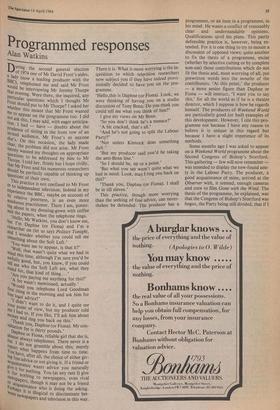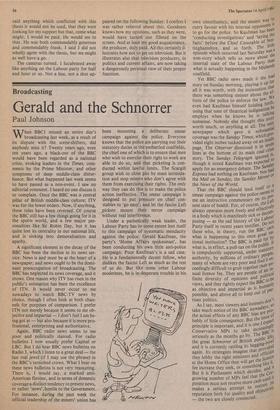Programmed responses
Alan Watkins
During the second general election of 1974 one of Mr David Frost's aides, a lady (now a leading producer with the 813C), telephoned me and said Mr Frost Would be interviewing Mr Jeremy Thorpe that evening. Were there, she inquired, any Particular questions which I thought Mr Frost should put to Mr Thorpe? I asked her whether this meant that Mr Frost wanted me to appear on the programme too. I did not ask this, I may add, with eager anticipa- tion. T had — have — doubts about the Prudence of sitting in the front row of an invited audience, Mr Frost's or anyone else's. On this occasion, the lady made el, the problem did not arise. Mr Frost meal the wanted my thoughts on appropriate questions to be addressed by him to .Mr Thorpe. I told her, firmly but I hope civilly, that Mr Frost and his numerous researchers should be perfectly capable of thinking up questions of their own. This practice is not confined to Mr Frost independent television. Indeed in my or to i FxPerience the BBC, maybe on account of itsrelative poorness, is an even more assiduous practitioner. There I am, potter- ing about in my dressing-gown with coffee all,d the papers, when the telephone rings. Hello, Mr Watkins, you don't know me, but PM Daphne (or Fiona) and I'm a researcher on (let us say) Politics Tonight, and I wonder whether you could tell me something about the Soft Left.' ,You want me to appear, is that it?' 'Well, that wasn't quite what we had in linnet this time, although I'm sure you'd be tell good, but, you know, if you could '_ea me who the Soft Left are, what they stand for, that kind of thing...' 'Are you paying me anything for this?' ,A fee wasn't mentioned, actually.'
f, Would You telephone Lord Goodman 1,.irst thing in the morning and ask him for Free legal advice?'
ynI didn't Want to do it, and I quite see Point of view, but my producer told .! 1 had to. If you like, I'll ask him about me and ring you back on this.' su,l'h.ank You, Daphne (or Fiona). My con- tlation fee is thirty pounds.' , paPhne or Fiona, reliable girl that she. is, 'if most always telephones. There never is a r.ee. I do not grumble about, this; merely 1,Porr what happens from time to time. iii?,/ii.have, after all, the choice of either gilt- ,„5 'Fee. advice or not giving it. If a friend or 'qu.aintance wants advice you naturally nfornothing. You (at any rate I) give n. or nothing to newspapers, even rival 0.`WsPapers, though it may not be a friend acquaintance who is doing the asking. ZritaPs it is illogical to discriminate bet- cen newspapers and television in this way.
There it is. What is more worrying is the in- quisition to which television researchers now subject you if they have indeed provi- sionally decided to have you on the pro- gramme.
'Hello,this is Daphne (or Fiona). Look, we were thinking of having you on a studio discussion of Tony Benn. Do you think you could tell me what you think of him?'
I give my views on Mr Berm. `So you don't think he's a menace?' 'A bit cracked, that's all.' 'And he's not going to split the Labour Party?' `Not unless Kinnock does something daft.'
'But my producer said you'd be taking the anti-Benn line.'
`So I should be, up to a point.' `But what you say wasn't quite what we had in mind. Look, may I ring you back on this?'
'Thank you, Daphne (or Fiona). I shall be in till eleven.'
This practice, though more worrying than the seeking of free advice, can never- theless be defended. The producer has a
programme, or an item in a programme, in his mind. He wants a conflict of reasonably clear and understandable opinions. Qualifications spoil his plans. This partly defensible practice is, however, being ex- tended. For it is one thing to try to mount a discussion of opposed views; quite another to fix the thesis of a programme, excise (whether by selective cutting or by complete non-use) those contributions which do not fit the thesis and, most worrying of all, put prewritten words into the mouths of the contributors. 'At this point,' the producer — a more senior figure than Daphne or Fiona — will instruct, 'I want you to say this,' for all the world as if he is a theatre director, which I suppose is how he regards himself. The producers of Weekend World are particularly good (or bad) examples of this development. However, I cite this pro- gramme not because I have any reason to believe it is unique in this regard but because I have a slight experience of its methods.
Some months ago I was asked to appear on a Weekend World programme about the Second Congress of Bishop's Stortford. This gathering — few will now remember was intended to display the new-found ami- ty in the Labour Party. The producer, a good acquaintance of mine, arrived at the Observer with, it seemed, enough cameras and crew to film Gone with the Wind. The thesis of the programme, he explained, was that the Congress of Bishop's Start ford was bogus, the Party being still divided, that if I
said anything which conflicted with this thesis it would not be used, that they were looking for my support but that, come what might, I would be paid. He would see to that. He was both commendably generous and commendably frank. I said I did not wholly agree with the thesis, but we might as well have a go.
The cameras turned. I lucubrated away like anything on the Labour party for half and hour or so. Not a line, not a shot ap- peared on the following Sunday. I confess I was rather relieved about this. Goodness knows how my opinions, such as they were, would have turned out filleted on the screen. And at least my good acquaintance, the producer, duly paid. All this certainly il- lustrates how not to get on television. But it illustrates also that television producers, in politics and current affairs, are now taking a dangerously personal view of their proper function.











































 Previous page
Previous page